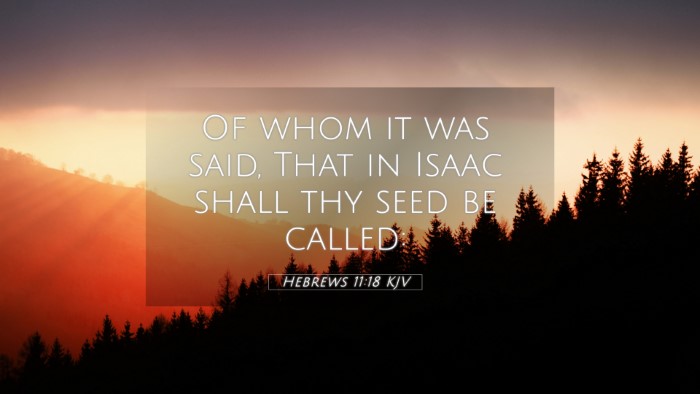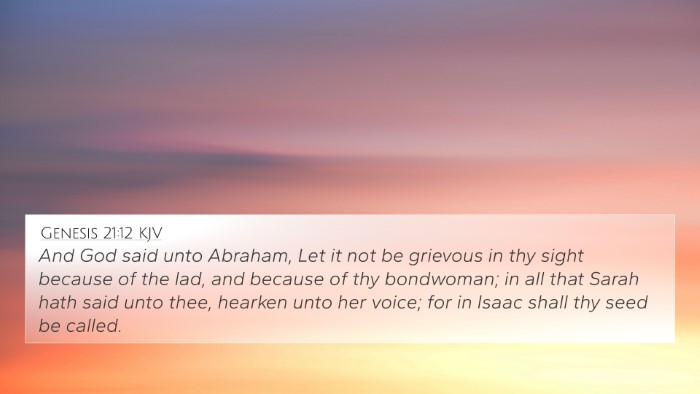Hebrews 11:18 - Meaning and Interpretation
Hebrews 11:18 states:
"Of whom it was said, That in Isaac shall thy seed be called."
This verse reflects on the faith of Abraham and God's promises regarding his son Isaac, showcasing the themes of divine covenant and the significance of generational blessings. The verse calls attention to the miraculous promise which had profound implications for the lineage of Israel and ultimately for humanity as evidenced in the New Testament.
Commentary Insights
Matthew Henry's Commentary:
-
Henry emphasizes Abraham's faith in receiving the promise concerning Isaac as a pivotal moment. Abraham's willingness to embrace God's promise demonstrates a deep-seated confidence in God's plan, even when circumstances appeared impossible.
-
He discusses the importance of Isaac's role in God's covenant, noting that his birth was a fulfillment of God's historical promise replete with spiritual significance.
Albert Barnes' Notes:
-
Barnes explains that this verse encapsulates the essence of faith that is foundational in understanding the relationship between God's promises and human action.
-
He also elaborates on the broader implications, suggesting that the mention of Isaac points to the lineage of Christ, linking the Old Testament promises to the New Testament fulfillments.
Adam Clarke's Commentary:
-
Clarke highlights the historical narrative of Isaac's birth, reinforcing the miraculous nature of God’s promise to Abraham amidst doubt and delay.
-
He draws attention to how faith transcends time, underscoring that Abraham’s lineage through Isaac points towards a greater promise fulfilled in Jesus Christ.
Thematic Connections
Hebrews 11:18 can be understood in light of several thematic Bible verse connections:
-
Genesis 21:12: "In Isaac shall thy seed be called." - Direct correlation affirming God's promise to Abraham.
-
Romans 4:3: "For what does the Scripture say? 'Abraham believed God, and it was credited to him as righteousness.'" - Highlights the principle of faith leading to righteousness.
-
Galatians 3:29: "And if you are Christ's, then you are Abraham's offspring, heirs according to promise." - Connects believers with Abraham’s promise.
-
Matthew 1:2-3: "Abraham was the father of Isaac." - Tracing the lineage through Isaac to Jesus.
-
Hebrews 11:1: "Now faith is the substance of things hoped for." - Introduces the overarching theme of faith present in the narrative of Abraham and Isaac.
-
James 2:21: "Was not Abraham our father justified by works, when he had offered Isaac his son upon the altar?" - Connects faith and action in Abraham’s relationship with God.
-
1 Peter 1:10-11: "Of which salvation the prophets have inquired and searched diligently." - Alludes to the prophetic understanding of the promised lineage.
Application of Cross-References
Understanding Hebrews 11:18 in conjunction with the above cross-referenced verses allows for a deeper appreciation of:
-
Covenantal Theology: Recognizing the continuity of God's promises through generations.
-
The Role of Faith: How faith manifests not only in belief but also in action as illustrated by Abraham’s willingness to offer Isaac.
-
Inter-Biblical Dialogue: Observing the connections that strengthen the understanding of God's unfolding redemptive plan through scripture.
Conclusion
In summary, Hebrews 11:18 is a profound scripture that acts as a fulcrum between the Old and New Testaments. It highlights the importance of faith in God's promises, serves as a reminder of God’s unwavering commitment to His covenant, and anchors believers in the rich theological heritage stemming from Abraham through Isaac down to Jesus Christ, the ultimate fulfillment of God's promises.
As you continue your study, utilizing tools for Bible cross-referencing can greatly enhance your understanding. By exploring the connections between Bible verses and engaging with thematic Bible verse connections, you can navigate the depths of Biblical texts more effectively.





